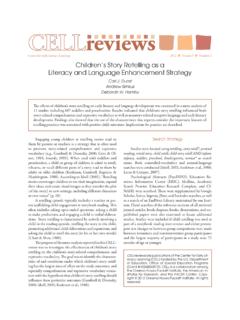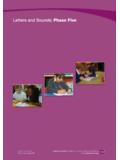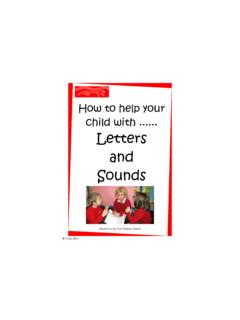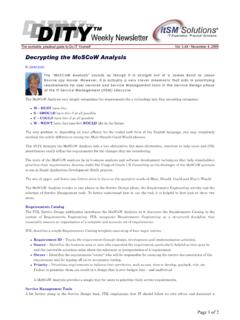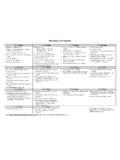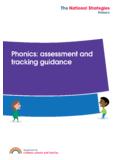Transcription of Early Literacy Learning Domains
1 Early Literacy Learning Domains Self-Guided Learning Module 2 What is this CELL self-guided training? This self-guided training focuses on Early Literacy Domains The purpose of this training is to share information about: The phases and Domains of Early Literacy Learning 3 Pause and think about Early Literacy before you proceed! Write down the responses that immediately come to mind for each of these questions. What is Early Literacy to you? Does Early Literacy only involve books or are there other ways to do Early Literacy ? When does Early Literacy start? How do children develop Early Literacy abilities? 4 What is Early Literacy to you? Early Literacy refers to the knowledge and skills that young children from birth to age five need to read, write, and communicate. Developed before formal reading instruction, Early Literacy consists of print and language Learning . Print-related Learning includes recognizing letters of the alphabet, understanding what is read, expressing words in writing, and knowing the rules of writing.
2 Language-related Learning includes recognizing the different sounds that make up words, being able to use words to communicate, and understanding what is said by others. 5 Does Early Literacy only involve books or are there other ways to do Early Literacy ? Early Literacy activities should consist of a rich mix of language and print-related Learning experiences such as: storytelling answering questions interacting with various types of environmental print engaging in drawing or pre-writing activities singing nursery rhymes doing finger plays 6 When does Early Literacy start? Early Literacy starts at birth. Infants begin to learn about print and language by interacting with people and objects that are interesting and enjoyable. It is never too Early to engage young children in Early Literacy activities! 7 How do children develop Early Literacy abilities? Informal Learning Experiences Formal Learning Experiences Literacy -Rich Environments 8 Introduction: Early Literacy Phases and Domains CELL has conceptualized Early Literacy Learning to be composed of: Three phases Seven Domains 9 Introduction: Phases of Early Literacy Learning Pre- Literacy development From birth to approximately 12 to 15 months developmental age The communication and social skills acquired before language onset that form the foundation for language acquisition and emergent Literacy skills Includes a child s acquisition of a number of important communication and Literacy -related skills 10 Introduction.
3 Phases of Early Literacy Learning Emergent Literacy development From approximately 12-15 to 30 months of age The verbal and nonverbal skills that are the foundation for the process of Learning to read, write, and develop other Literacy -related abilities Includes the acquisition of a variety of emergent Literacy development skills and accomplishments 11 Introduction: Phases of Early Literacy Learning Early Literacy development From approximately 30 months of age to five years The acquisition and mastery of the fundamentals of reading, writing, and other Literacy -related skills Includes the mastery of many of the fundamentals and precursors of conventional Literacy skills and accomplishments 12 Introduction: Domains of Early Literacy Learning Early Literacy Domains are not: Chronological or linear Discrete or independent Early Literacy Domains are: Overlapping and interrelated Development in one domain is often associated with development in other Domains as well.
4 13 Introduction: Domains of Early Literacy Learning Linguistic-Processing Skills Listening Comprehension Oral Language Phonological Awareness Print-Related Skills Alphabet Knowledge Print Awareness Written Language Text Comprehension 14 Introduction: Domains of Early Literacy Learning Linguistic-Processing Skills Listening Comprehension Oral Language Phonological Awareness 15 Introduction: Domains of Early Literacy Learning Print-Related Skills Alphabet Knowledge Print Awareness Written Language Text Comprehension 16 Illustration: Linguistic Processing Skills Listening Comprehension Receptive language, the ability to hear and understand speech What types of experiences do infants, toddlers and preschoolers need to develop their listening comprehension skills? 17 Experiences to Support an Infant s Development of Listening Comprehension Speaking in a nurturing, caring manner Motherese or parentese Repetition Shared storybook reading 18 Experiences to Support a Toddler s Development of Listening Comprehension Engage toddlers in conversations Shared storybook reading Listening games Songs and finger plays 19 Experiences to Support a Preschooler s Development of Listening Comprehension Engage preschoolers in conversations Listening games Re-telling stories Shared storybook reading that involves in-depth discussion, questions, and reflection 20 Illustration: Linguistic Processing Skills Oral Language The ability to use expressive language to communicate with others What types of experiences do infants, toddlers and preschoolers need to develop their oral language skills?
5 21 Experiences to Support an Infant s Development of Oral Language Talk to Infants Vary tone and pitch of voice Say words with enthusiasm and interest Shared story book reading 22 Experiences to Support a Toddler s Development of Oral Language Engage in conversation Shared storybook reading, especially repeated reading of familiar or favorite books Songs and finger plays Games and play that encourage the use of language 23 Experiences to Support a Preschooler s Development of Oral Language Meaningful conversations Invent new stories and retell familiar stories Shared storybook reading Question-asking and answering conversations Opportunity to learn and use new vocabulary Opportunities to match words they hear with images on paper 24 Illustration: Linguistic Processing Skills Phonological Awareness Ability to distinguish between and manipulate sounds in spoken language; hear similarities, difference, and patterns in sounds What types of experiences do infants, toddlers and preschoolers need to develop their phonological awareness skills?
6 25 Experiences to Support an Infant s Development of Phonological Awareness Interesting speech high pitch, sing-song, etc. Motherese Rhymes, songs, and finger plays Cooing, babbling and talking games 26 Experiences to Support a Toddler s Development of Phonological Awareness Conversations Book reading Singing Nursery rhymes Rhyming and word games Made-up rhyming words 27 Experiences to Support a Preschooler s Development of Phonological Awareness Listening games Nursery rhymes Songs 28 Illustration: Print-Related Skills Alphabet Knowledge Recognize and name letters of the alphabet; understand letter-sound correspondence What types of experiences do infants, toddlers and preschoolers need to develop their alphabet knowledge skills? 29 Experiences to Support an Infant s Development of Alphabet Knowledge Exposure to the alphabet through use of toys such as alphabet blocks Print in the environment Alphabet songs Alphabet books 30 Experiences to Support a Toddler s Development of Alphabet Knowledge Recognizing written name Identifying letters in name Alphabet songs Alphabet books Alphabet toys and games 31 Experiences to Support a Preschooler s Development of Alphabet Knowledge Recognition of letters in name Alphabet toys, books, and games Environmental print Matching pictures with letters Letter-sound games 32 Illustration: Print-Related Skills Print Awareness Understanding the purposes and conventions of print What types of experiences do infants, toddler and preschoolers need to develop their print awareness?
7 33 Experiences to Support an Infant s Development of Print Awareness Interaction with books (holding, chewing, looking at pictures) Shared storybook reading Everyday opportunities to interact with books 34 Experiences to Support a Toddler s Development of Print Awareness Exposure to environmental print Shared storybook reading Independent exploration of books Observing adults use print Observing adults read 35 Experiences to Support a Preschooler s Development of Print Awareness Independent exploration of books Shared storybook reading Use environmental print Recognize printed name Drawing Invented spelling Dictating stories 36 Illustration: Print-Related Skills Written Language Communicate through printed language What types of experiences do infants, toddlers and preschoolers need to develop their written language? 37 Experiences to Support an Infant s Development of Written Language Exploring with a variety of sensory materials, such as finger paint Exploring play with writing and art materials Observing adults writing 38 Experiences to Support a Toddler s Development of Written Language Daily opportunities to explore drawing and painting Playing with play dough Observing adults write in daily routines Any games that strengthen fine motor muscles 39 Experiences to Support a Preschooler s Development of Written Language Opportunities to draw, write, scribble Art and writing materials Writing projects Observing adults writing daily Computer games 40 Illustration: Print-Related Skills Text Comprehension Ability to decode and comprehend written language What types of experiences do infants, toddlers and preschoolers need to develop their text comprehension skills?
8 41 Experiences to Support an Infant s Development of Text Comprehension Shared storybook reading Pointing to words and pictures in books Positive experiences with books 42 Experiences to Support a Toddler s Development of Text Comprehension Shared storybook reading Retelling favorite books and stories Observe adults point to words and pictures in books Environmental print 43 Experiences to Support a Preschooler s Development of Text Comprehension Varied experiences with books Environmental print Shared story book reading Finger-point reading Opportunities for invented spelling Literacy play materials In everyday routines 44 Practice: Identify Literacy Domains Go to the CELL website at and locate the Practitioner Practice Guides. Select either infants, toddlers, or preschoolers. Select 3 different practice guides to read. After reading each practice guide, identify the Literacy Domains that are addressed in each of the three practice guides.
9 Identify any examples of: Listening comprehension Oral Language Phonological awareness Alphabet knowledge Print awareness Written language Text comprehension 45 Evaluation: Identifying Literacy Domains were some of the activities used to support Literacy experiences? it difficult to identify the Literacy Domains within the practice guides? role did the adult play? did the child/children respond? 46 Reflection: Early Literacy Domains 1. How have your thoughts changed about Early Literacy ? 2. Is there anything about your practices you will change after Learning more about Early Literacy Domains ? 47 Thank you! Thank you for accessing the CELL self-guided module on Early Literacy Domains . Remember, you can download free resources from the CELL website at





